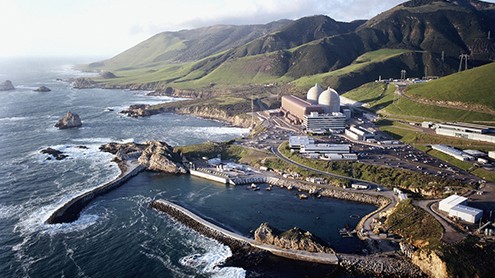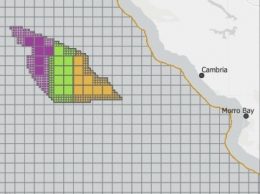Mayors urge CPUC to deny PG&E proposal to close Diablo Canyon
IN THIS ARTICLE
- Central Coast Topic
- Philip Joens Author
By Philip Joens Thursday, September 15th, 2016

Diablo Canyon Nuclear Plant near San Luis Obispo County’s Avila Beach is the last operating nuclear plant on the West Coast. (photo courtesy of PG&E Corp.)
A group of mayors from six San Luis Obispo County cities asked the California Public Utilities Commission to deny a proposal to close the Diablo Canyon Power Plant because the proposal does not fully outline steps to be taken to mitigate effects of the closure.
In a request filed with the utilities commission on Sept. 15, mayors from San Luis Obispo, Pismo Beach, Paso Robles, Atascadero, Morro Bay and Arroyo Grande said Pacific Gas and Electric did not adequately outline the economic effects the plant’s closure will have on their communities in its proposal to close the plant.
The request also asks for an independent third party to analyze the effects of the plant’s closure and for PG&E to disclose its long term plans for handling nuclear waste and spent fuel rods at the site.
On June 21, PG&E announced plans to close the plant, which opened in 1985 and was originally touted as a form of energy cleaner than coal-fired power plants. PG&E reached the closure proposal with several environmental groups and labor unions who signed onto an agreement that outlined PG&E’s plans to close the plant, retrain workers living near the plant, and money PG&E planned to pay to communities to minimize the closure’s impact on regional tax bases.
The plan called for a nine-year closure process that aims to shut down both generators at the plant by the end of 2025. On June 28, the California State Lands Commission approved a plan to extend two land lease licenses at the plant that will expire when permits for the plant with the Nuclear Regulatory Commission expire in 2025.
Parties in the joint proposal submitted the proposal to the utilities commission, which will consider the application this fall and should release a final decision by June 2017.
In the request, the cities made it clear that they do not oppose the closure of the power plant but simply want more transparency from PG&E during the long closure process.
“PG&E never engaged in any dialogue with any of the nearby cities regarding the application prior to its public release,” the request says. “In spite of repeated requests from elected officials, no PG&E officials authorized to discuss and negotiate terms of the closure met with city representatives until Sept. 14.”
Officials estimate the impact of the Diablo Canyon Power Plant to be at least $1 billion per year on the economies of San Luis Obispo and Santa Barbara counties. Employees at the plant earned an average salary of $157,000 in 2014, according to PG&E, and the request says payroll at the plant was $202 million in 2013.
Annual expenditures on local goods and services were about $18 million in 2013 and local expenditures by Diablo Canyon retirees were about $19 million in 2013, the request states. The request also says Diablo Canyon created a total of 3,358 jobs in 2011, including 1,483 at the plant itself.
The request says PG&E deferred to other stakeholders when negotiating terms of the closure.
“At a minimum, the nearby cities reasonably expected they would be treated as substantial and equal stakeholders in any significant decisions regarding Diablo Canyon’s operation,” the request says.”
The request also claims the amount of money PG&E has proposed paying to local governments to mitigate the loss of income and property taxes is inadequate because local property taxes alone during that period are estimated at $200 million.
“The application states PG&E will support funding of continuing revenue streams to address community needs and concerns, but it explicitly includes only $49.5 million in compensation over a nine-year period to San Luis Obispo County,” the request says. “That payment is wholly insufficient to cover the loss it purportedly addresses.”
PG&E spokesman Blair Jones said in a statement to the Business Times that PG&E values the input from the mayors and wants them to be part of the dialogue surrounding the closure moving forward.
“PG&E has long been a part of the local region. We value this community and our place in it,” Jones said. “That’s why the Joint Proposal includes proposed payments that are designed to support the community in successfully transitioning over the next nine years to a future without the plant in operation.”
• Contact Philip Joens at [email protected].










